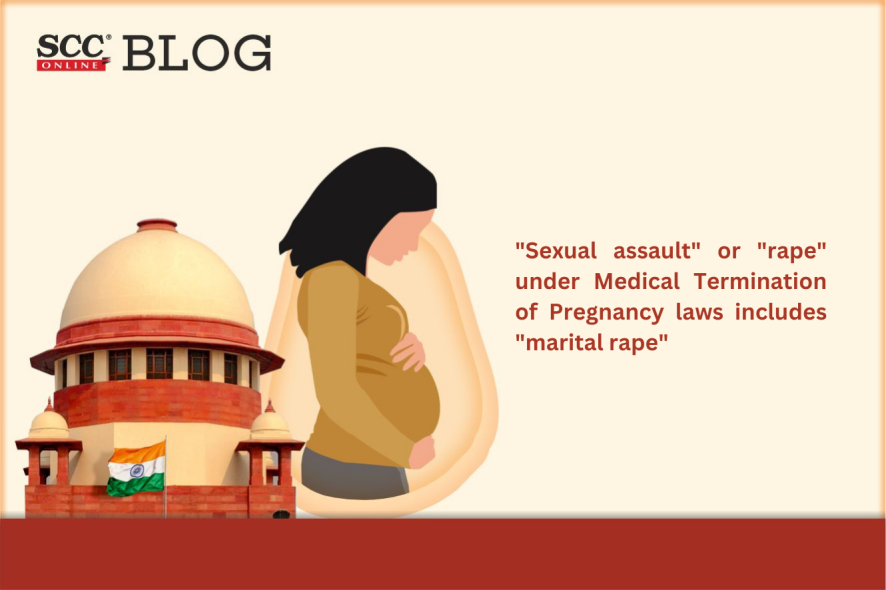Supreme Court: The 3-judge bench of Dr. DY Chandrachud*, AS Bopanna and JB Pardiwala, JJ, while holding that unmarried or single women have the right to safe abortion as much as the married women, went into a detailed discussion around the equal status of married and unmarried or single women for the purpose of the Medical Termination of Pregnancy laws.
While the Court gave a purposive interpretation to Rule 3B(c) of the Medical Termination of Pregnancy Rules, 2003 (MTP Rules) and observed that “prohibiting unmarried or single pregnant women (whose pregnancies are between twenty and twenty-four weeks) from accessing abortion while allowing married women to access them during the same period would fall foul of the spirit guiding Article 14”, it also went ahead to include married women under the scope of Rule 3B(a) i.e. ‘survivors of sexual assault or rape or incest’.
https://www.scconline.com/blog/post/2022/09/29/unmarried-persons-women-cannot-be-denied-right-abortion-based-on-patriarchal-principles-about-permissible-sex-supreme-court-chundrachud-legal-research-updates-news/
This observation of the Court is particularly interesting as the challenge to Exception 2 to Section 375 of the IPC is already pending consideration before the Supreme Court. While the Court left the constitutional validity to be decided in the appropriate proceeding, it observed,
“It is only by a legal fiction that Exception 2 to Section 375 of the IPC removes marital rape from the ambit of rape, as defined in Section 375. Understanding “rape” under the MTP Act and the rules framed thereunder as including marital rape does not have the effect of striking down Exception 2 to Section 375 of the IPC or changing the contours of the offence of rape as defined in the IPC.”
The Court explained that Rule 3B(a) is based on an acknowledgement of the reality that survivors of sexual assault, rape, or incest may face immense stigma if and when they share the fact of their assault with others, including family members. Many survivors, including minors, may not even be aware that pregnancy is a possible consequence of rape. Hence, the delay in revealing the fact that a man has raped them may lead to a delay in discovering the pregnancy. Resultantly, the woman in question may be unable to access medical facilities in a timely fashion and may therefore find herself unable to terminate the pregnancy before the completion of twenty weeks.
In the context of marital rape, the Court held that married women may also form part of the class of survivors of sexual assault or rape.
“The ordinary meaning of the word ‘rape’ is sexual intercourse with a person, without their consent or against their will, regardless of whether such forced intercourse occurs in the context of matrimony. A woman may become pregnant as a result of non-consensual sexual intercourse performed upon her by her husband. We would be remiss in not recognizing that intimate partner violence is a reality and can take the form of rape. The misconception that strangers are exclusively or almost exclusively responsible for sex- and gender-based violence is a deeply regrettable one. Sex- and gender-based violence (in all its forms) within the context of the family has long formed a part of the lived experiences of scores of women.”
Considering the history of offences against women in India, including sexual assault by family members, the Court observed that it is not inconceivable that married women become pregnant as a result of their husbands having “raped” them.
“The nature of sexual violence and the contours of consent do not undergo a transformation when one decides to marry. The institution of marriage does not influence the answer to the question of whether a woman has consented to sexual relations. If the woman is in an abusive relationship, she may face great difficulty in accessing medical resources or consulting doctors.”
The Court also made clear that in order to avail the benefit of Rule 3B(a), the woman need not necessarily seek recourse to formal legal proceedings to prove the factum of sexual assault, rape or incest. Neither Explanation 2 to Section 3(2) nor Rule 3B(a) require that the offender be convicted under the IPC or any other criminal law for the time being in force before the pregnant woman can access an abortion. Further, there is no requirement that an FIR must be registered or the allegation of rape must be proved in a court of law or some other forum before it can be considered true for the purposes of the MTP Act. Such a requirement would be contrary to the object and purpose of the MTP Act. In fact, Explanation 2 triggers the legal presumption as to mental trauma “where any pregnancy is alleged by the pregnant woman to have been caused by rape.”
Taking note of all these factors, the Court, hence, held that notwithstanding Exception 2 to Section 375 of the IPC, the meaning of the words “sexual assault” or “rape” in Rule 3B(a) includes a husband’s act of sexual assault or rape committed on his wife. The meaning of rape must therefore be understood as including marital rape, solely for the purposes of the MTP Act and any rules and regulations framed thereunder. Any other interpretation would have the effect of compelling a woman to give birth to and raise a child with a partner who inflicts mental and physical harm upon her.
[X v. HEALTH AND FAMILY WELFARE DEPARTMENT, 2022 SCC OnLine SC 1321, decided on 29.09.2022]
*Judgment by: Dr. Justice DY Chandrachud
For Petitioner(s): Advocate Dr. Amit Mishra
For Respondent(s): ASG Aishwarya Bhati
Also Read
https://www.scconline.com/blog/post/2022/07/22/unmarried-woman-cannot-be-denied-right-to-safe-abortion-supreme-court-delhi-high-court-termination-of-pregnancy-legal-laws-news-research-updates/






